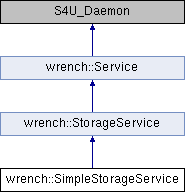 |
WRENCH
1.10
Cyberinfrastructure Simulation Workbench
|
Overview | Installation | Getting Started | WRENCH 101 | WRENCH 102 |
 |
WRENCH
1.10
Cyberinfrastructure Simulation Workbench
|
Overview | Installation | Getting Started | WRENCH 101 | WRENCH 102 |
A storage service that provides direct access to some storage resources (e.g., one or more disks). An important (configurable) property of the storage service is SimpleStorageServiceProperty::BUFFER_SIZE (see documentation thereof), which defines the buffer size that the storage service uses. Specifically, when the storage service receives/sends data from/to the network, it does so in a loop over data "chunks", with pipelined network and disk I/O operations. The smaller the buffer size the more "fluid" the model, but the more time-consuming the simulation. A large buffer size, however, may lead to less realistic simulations. At the extreme, an infinite buffer size would correspond to fully sequential executions (first a network receive/send, and then a disk write/read). Setting the buffer size to "0" corresponds to a fully fluid model in which individual data chunk operations are not simulated, thus achieving both accuracy (unless one specifically wishes to study the effects of buffering) and quick simulation times. For now, setting the buffer size to "0" is not implemented. The default buffer size is 10 MiB (note that the user can always declare a disk with arbitrary bandwidth in the platform description XML). More...
#include <SimpleStorageService.h>

Public Member Functions | |
| SimpleStorageService (std::string hostname, std::set< std::string > mount_points, std::map< std::string, std::string > property_list={}, std::map< std::string, double > messagepayload_list={}) | |
| Public constructor. More... | |
 Public Member Functions inherited from wrench::StorageService Public Member Functions inherited from wrench::StorageService | |
| virtual std::map< std::string, double > | getFreeSpace () |
| Synchronously asks the storage service for its capacity at all its mount points. More... | |
| std::string | getMountPoint () |
| Get the mount point (will throw is more than one) More... | |
| std::set< std::string > | getMountPoints () |
| Get the set of mount points. More... | |
| virtual std::map< std::string, double > | getTotalSpace () |
| Get the total static capacity of the storage service (in zero simulation time) More... | |
| bool | hasMountPoint (std::string mp) |
| Checked whether the storage service has a particular mount point. More... | |
| bool | hasMultipleMountPoints () |
| Checked whether the storage service has multiple mount points. More... | |
| void | stop () override |
| Stop the service. | |
 Public Member Functions inherited from wrench::Service Public Member Functions inherited from wrench::Service | |
| void | assertServiceIsUp () |
| Throws an exception if the service is not up. More... | |
| std::string | getHostname () |
| Get the name of the host on which the service is / will be running. More... | |
| double | getNetworkTimeoutValue () |
| Returns the service's network timeout value. More... | |
| bool | getPropertyValueAsBoolean (std::string) |
| Get a property of the Service as a boolean. More... | |
| double | getPropertyValueAsDouble (std::string) |
| Get a property of the Service as a double. More... | |
| std::string | getPropertyValueAsString (std::string) |
| Get a property of the Service as a string. More... | |
| unsigned long | getPropertyValueAsUnsignedLong (std::string) |
| Get a property of the Service as an unsigned long. More... | |
| bool | isUp () |
| Returns true if the service is UP, false otherwise. More... | |
| void | resume () |
| Resume the service. More... | |
| void | setNetworkTimeoutValue (double value) |
| Sets the service's network timeout value. More... | |
| void | start (std::shared_ptr< Service > this_service, bool daemonize, bool auto_restart) |
| Start the service. More... | |
| void | suspend () |
| Suspend the service. | |
Additional Inherited Members | |
 Static Public Member Functions inherited from wrench::StorageService Static Public Member Functions inherited from wrench::StorageService | |
| static void | deleteFile (WorkflowFile *file, std::shared_ptr< FileLocation > location, std::shared_ptr< FileRegistryService > file_registry_service=nullptr) |
| Synchronously delete a file at a location. More... | |
| static bool | lookupFile (WorkflowFile *file, std::shared_ptr< FileLocation > location) |
| Synchronously asks the storage service whether it holds a file. More... | |
| static void | readFile (WorkflowFile *file, std::shared_ptr< FileLocation > location) |
| Synchronously read a file from the storage service. More... | |
| static void | writeFile (WorkflowFile *file, std::shared_ptr< FileLocation > location) |
| Synchronously write a file to the storage service. More... | |
A storage service that provides direct access to some storage resources (e.g., one or more disks). An important (configurable) property of the storage service is SimpleStorageServiceProperty::BUFFER_SIZE (see documentation thereof), which defines the buffer size that the storage service uses. Specifically, when the storage service receives/sends data from/to the network, it does so in a loop over data "chunks", with pipelined network and disk I/O operations. The smaller the buffer size the more "fluid" the model, but the more time-consuming the simulation. A large buffer size, however, may lead to less realistic simulations. At the extreme, an infinite buffer size would correspond to fully sequential executions (first a network receive/send, and then a disk write/read). Setting the buffer size to "0" corresponds to a fully fluid model in which individual data chunk operations are not simulated, thus achieving both accuracy (unless one specifically wishes to study the effects of buffering) and quick simulation times. For now, setting the buffer size to "0" is not implemented. The default buffer size is 10 MiB (note that the user can always declare a disk with arbitrary bandwidth in the platform description XML).
| wrench::SimpleStorageService::SimpleStorageService | ( | std::string | hostname, |
| std::set< std::string > | mount_points, | ||
| std::map< std::string, std::string > | property_list = {}, |
||
| std::map< std::string, double > | messagepayload_list = {} |
||
| ) |
Public constructor.
| hostname | the name of the host on which to start the service |
| mount_points | the set of mount points |
| property_list | a property list ({} means "use all defaults") |
| messagepayload_list | a message payload list ({} means "use all defaults") |